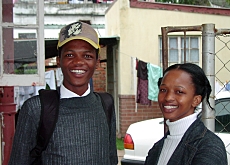
helping inmates to find life after prison

Swiss development aid has been supporting a project reintegrating prisoners back into society in South Africa, a country with one of the highest levels of crime.
The National Institute for Crime Prevention and the Reintegration of Offenders (NICRO) looks after prisoners prior to their release as well during their return back home.
With its tree-lined avenues, elegant houses, town hall and red-brick churches, Pietermaritzburg, the capital of KwaZulu-Natal, is one of the best-preserved Victorian cities in the world – so it is quite hard to believe that it has similar crime levels to the rest of South Africa.
But as soon as you start to leave the centre, the city begins to have a more African feel about it. And it is here that we find “Remember”, as he likes to be known, a shy, lanky 20-year-old man living in a small, run-down shack.
Remember was abandoned by his father and brought up by his aunt, along with his two short-tempered, spoilt cousins.
At the age of 13 Remember was
sent to a children’s home. Three years later he found himself living on the streets, a member of a gang and seeking comfort in alcohol and drugs.
At that age, even if you do not have any money, you have to look as if you do. It was at that time that he got caught stealing a pair of Nike shorts and ended up with a one-month prison sentence.
Minor criminal
When he was let out, Remember broke into an office with two friends to steal a stove and an iron. He was given three years, reduced to 16 months following an amnesty.
Remember is not a serious criminal, unlike 55 per cent of the 157,000
detainees in South Africa who have been sentenced or are awaiting sentence for violent crime, such as armed robbery or murder.
His life story is a simple tale of poverty, made all the more unbearable when you are young and surrounded by great wealth.
“Pressure to consume is everywhere,” says Irene Dugmore, regional director of NICRO.
“Everyone wants a mobile phone, nice clothes or an MP3 player. And many young lads also steal to offer their girlfriends a present for fear that they might leave them.”
Then there are dowries, without which a man cannot get married – “a real cultural disaster”, according to
Dugmore.
Remember met his fair share of serious criminals in prison. “If you don’t join a gang, you get beaten up quite often,” he says.
So he did not think twice when he heard about NICRO’s “Tough Enough” reintegration programme.
Responsibility
For those who join the programme, work begins in prison. Detainees are taught individually or in groups how to take responsibility for their mistakes, rebuild their confidence and put together a life plan.
NICRO encourages prisoners to develop artistic skills and every year organises exhibitions and a
national competition. Their artistic work can be both depressing, like their prison environment, and light and uplifting, like their hopes for a better future.
NICRO also helps guide former offenders after they are released and supports them in their contacts with their victims, families and the communities they have to rejoin.
Following his release, Remember, was able to move in with one of his aunts. And like many other former offenders, he went back to school.
Dume, his mentor at NICRO, continued to monitor his progress for one year.
“Very few of our clients re-offend,” says Dugmore, even if NICRO is
unable to provide any statistics or to monitor everyone.
Remember practises singing in the evenings in his bedroom. He is a big fan of rap music but is not fooled by the money and flashy lifestyle on show.
But who knows? Zuko Mgudlwa, one of NICRO’s clients, has already made a successful first album.
If Remember cannot become a singer, he would rather be a plumber. But for the time being he has to go to school.
As his mentor drops him off, she looks down at his flip-flops.
“It is terrible all this poverty. How can you talk about quality of life
when a schoolboy still doesn’t have a pair of shoes?” she asks.
swissinfo, Marc-André Miserez in Pietermaritzburg
The South African Prisoners’ Aid Association, founded in 1910, became the National Institute for Crime Prevention and the Reintegration of Offenders (NICRO) in 1970.
NICRO is active in nine provinces and employs 240 full-time staff and 600 volunteers.
The organisation reintegrates former offenders and supports victims; it also grants micro-loans to those who want to start their own business.
Every year it looks after 1,000 clients aged 18 to 25. NICRO’s success rate is thought to be high for a country where at least 75% of released prisoners re-offend.
At the end of 2005, there were 157,402 detainees in South Africa’s prisons, of whom 87,256 were accused of violent crime, such as murder.
Since September 2001, NICRO’s “Tough Enough” programme has received SFr710,000 ($587,000) of the SFr12 million that the Swiss Agency for Development and Cooperation gives annually to South Africa.
The annual budget of the “Tough Enough” programme is SFr630,000.

In compliance with the JTI standards
More: SWI swissinfo.ch certified by the Journalism Trust Initiative


























You can find an overview of ongoing debates with our journalists here . Please join us!
If you want to start a conversation about a topic raised in this article or want to report factual errors, email us at english@swissinfo.ch.